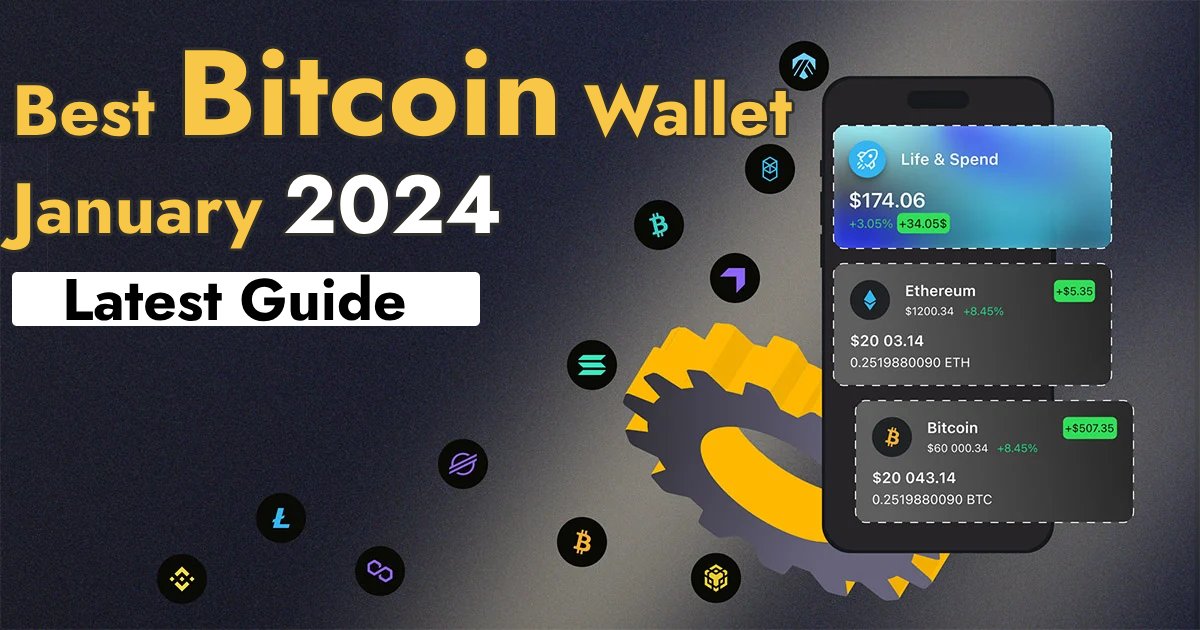In the ever-expanding realm of cryptocurrencies, the role of a Bitcoin wallet transcends mere storage; it becomes a digital fortress safeguarding one’s financial sovereignty. As we step into January 2024, the quest for the best Bitcoin wallet 2024 intensifies, demanding a discerning eye for security, functionality, and innovation.
Also Read My Latest Blog:

Key Considerations in Choosing a Best Bitcoin Wallet
A. Security Features
The bedrock of a reliable Bitcoin wallet lies in its security features. Encryption protocols and two-factor authentication are the sentinels guarding against potential cyber threats. A wallet’s ability to fortify itself in the face of evolving security challenges determines its worth.
B. User-Friendly Interface
From beginners to seasoned users, a Bitcoin wallet should offer a user-friendly interface catering to diverse skill levels. It must strike a delicate balance between accessibility for novices and advanced features for those well-versed in the intricacies of cryptocurrency management.
C. Cryptocurrency Compatibility
Beyond the confines of Bitcoin, a superior wallet exhibits versatility in supporting various altcoins. Cryptocurrency compatibility extends to cross-platform integration, ensuring a seamless experience across different devices and applications.
Hardware Wallets: Fortresses of Security

A. Definition and Functionality
Hardware wallets, the bastions of cold storage, employ mechanisms like secure element chips to shield private keys from online threats. Understanding the functionality of these physical devices is essential for those prioritizing security.
B. Advantages Over Software Wallets
Immunity to online threats and physical protection against cyber attacks are distinct advantages of hardware wallets. Brands like Ledger and Trezor have set industry standards, showcasing the efficacy of this security-first approach.
Software Wallets: Navigating the Digital Frontier
A. Overview of Software Wallets
Distinguishing between hot wallets and cold wallets, understanding the array of options like mobile, desktop, and web wallets, is crucial for users seeking flexibility and convenience.
B. Security Measures in Software Wallets
The security measures embedded in software wallets, such as multi-signature authentication and hierarchical deterministic features, elevate their reliability. Notable options like Electrum and Exodus embody a delicate fusion of aesthetics and functionality.
Paper Wallets: Bridging Tradition and Technology
A. Concept and Creation
Paper wallets, despite their seemingly traditional nature, introduce offline generation and QR code encryption for enhanced security. Users must comprehend the balance between tangible assets and vulnerability to physical damage or loss.
B. Advantages and Risks
The advantages of physical backup through paper wallets come with inherent risks. Safely using a paper wallet involves secure storage practices and limited usage to mitigate potential threats.
C. Steps to Safely Use a Paper Wallet
Navigating the landscape of paper wallets requires a nuanced approach. Users should adhere to secure storage practices and limit usage to specific scenarios, optimizing the balance between accessibility and security.
Mobile Wallets: Convenience at Your Fingertips
A. Mobile Wallet Overview
As mobile wallets become ubiquitous, understanding the dynamics of Android vs. iOS options and the overall user interface becomes imperative.
B. Security Features in Mobile Wallets
Biometric authentication and secure backup processes characterize secure mobile wallets. Notable options like MyEtherWallet and Coinomi offer multicurrency versatility, making them stand out in the competitive mobile wallet space.
Web Wallets: Navigating the Cloud
A. Web Wallet Dynamics
Web wallets, accessible from any browser, offer a convenient yet potentially vulnerable option. Users must comprehend the dynamics of accessing their assets in the cloud.
B. Security Protocols in Web Wallets
Web wallets employ SSL encryption and two-factor authentication as primary security protocols. However, users must remain vigilant about potential vulnerabilities and the risks associated with public Wi-Fi usage.
C. Cautionary Considerations for Web Wallet Users
Users of web wallets should exercise caution, particularly when using public Wi-Fi. Regular security audits and a proactive approach to risk management are crucial in navigating the cloud securely.
Multi-Signature Wallets: Collaborative Security
A. Understanding Multi-Signature Wallets
Multi-signature wallets introduce the concept of multiple private keys for authorization, enhancing security through collaborative consensus.
B. Advantages and Challenges
The advantages of multi-signature wallets, such as protection against single points of failure, come with the challenge of navigating the complexity in transaction authorization.
C. Popular Platforms Offering Multi-Signature Wallets
Platforms like BitGo and Copay exemplify the effectiveness of multi-signature solutions. BitGo, with its institutional-grade security, and Copay, offering a user-friendly approach, cater to users seeking collaborative security.
Choosing the Best Bitcoin Wallet for You
A. Personalized Security Needs
Assessing risk tolerance and balancing security with convenience are critical considerations when choosing the best Bitcoin wallet for individual needs.
B. User Experience Preferences
Deciding between intuitive design and advanced features depends on personal preferences. Compatibility with one’s tech ecosystem further enhances the overall user experience.
C. Future-Proofing Your Choice
Scalability and adaptability are key factors in future-proofing a chosen Bitcoin wallet. Staying informed about updates and upgrades ensures continued relevance in the dynamic cryptocurrency landscape.
Conclusion
In the quest for the best Bitcoin wallet of January 2024, users must navigate a landscape rife with options. By comprehending the nuances of security features, user-friendly interfaces, and cryptocurrency compatibility, individuals can make informed decisions. Whether opting for the fortress-like security of hardware wallets, the convenience of software wallets, the traditional appeal of paper wallets, or the accessibility of mobile and web wallets, each choice shapes the user’s digital experience. As we navigate the complexities of the cryptocurrency universe, the importance of ongoing vigilance cannot be overstated. Choose wisely, secure your assets, and embark on the digital future with confidence.



![Read more about the article How To Buy Shiba Inu (SHIB): Step-by-Step Guide [2024]](https://www.cryptocustomercare.org/wp-content/uploads/2023/12/How-To-Buy-Shiba-Inu-300x150.jpg)

